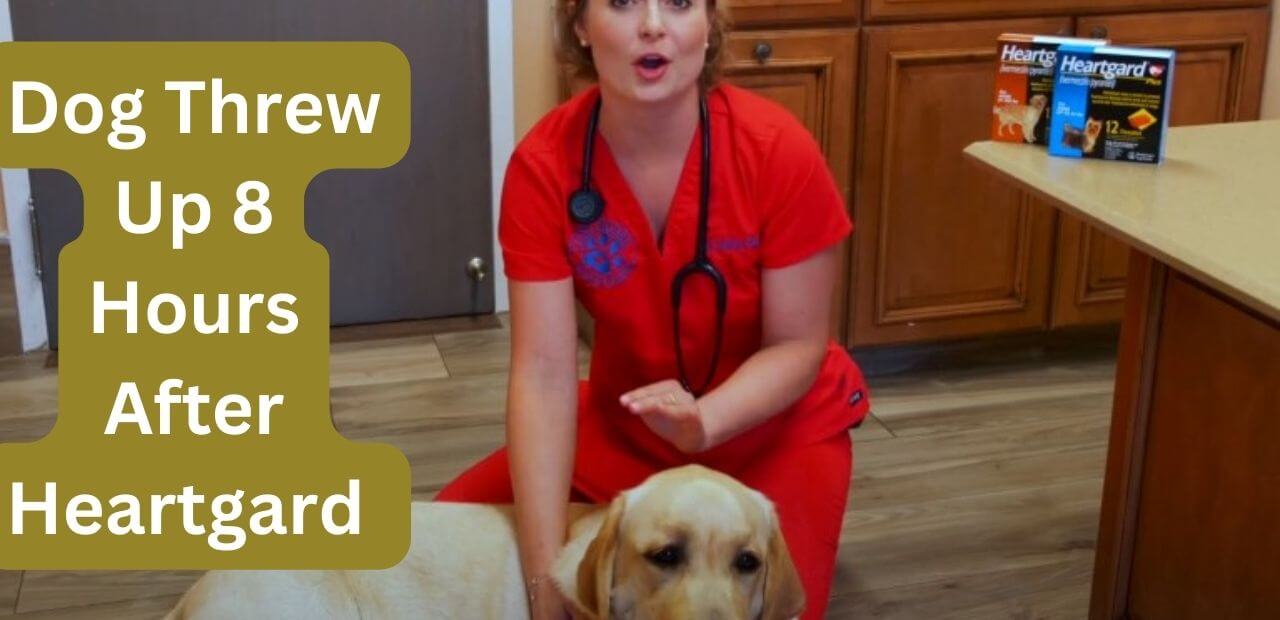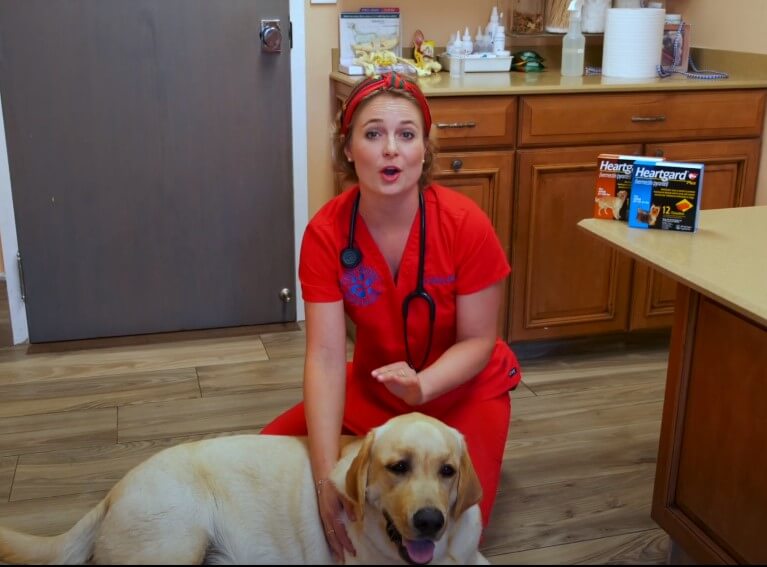After taking heartgard, if your dog throws up 8 hours later, it may be a reaction to the medication. Heartgard is a commonly prescribed medication for dogs to prevent heartworm disease.
It contains a powerful active ingredient that helps eliminate heartworm larvae. However, in some instances, dogs may experience adverse reactions to the medication. One potential side effect could be vomiting. If you notice your dog throwing up approximately 8 hours after giving them heartgard, it is crucial to understand the possible reasons and seek veterinary advice if necessary.
In this article, we will discuss why Dog Threw Up 8 Hours After Heartgard and what steps you can take to ensure your pet’s well-being.
Understanding Heartgard And Its Importance For Dogs
Heartgard is a prescription medication that plays a crucial role in protecting dogs from heartworm disease. As a responsible pet owner, it’s important to understand the benefits of heartgard and how to properly administer it to your furry friend. Let’s delve into the key points to help you gain a better understanding of this vital preventative measure.
Benefits Of Heartgard For Preventing Heartworm Disease:
- Heartgard is an effective monthly chewable tablet that helps defend against heartworm disease in dogs.
- It contains the active ingredient ivermectin, which acts as a preventive agent, eliminating the heartworm larvae that may have entered the dog’s system.
- By regularly giving your dog heartgard, you can significantly reduce the risk of your beloved pet contracting heartworm disease.
- Heartworm disease can be fatal, so prevention is crucial to ensure the well-being and longevity of your furry companion.
Recommended Dosage And Administration Guidelines:
- Heartgard comes in different strengths, depending on your dog’s weight. It’s important to follow your veterinarian’s instructions and choose the appropriate dosage.
- Administering heartgard is hassle-free, as it is available in a tasty chewable form that most dogs find palatable.
- It is recommended to give heartgard once a month, ideally on the same day to maintain consistency.
- To ensure maximum efficacy, heartgard should be given year-round, even during the colder months when mosquitoes are less prevalent.
Common Side Effects To Be Aware Of:
- While heartgard is generally safe for most dogs, there are some potential side effects that you should be aware of, although they are rare.
- Some dogs may experience mild side effects such as vomiting, diarrhea, or lack of appetite shortly after taking heartgard. These symptoms usually subside on their own without medical intervention.
- If you notice any unusual or severe reactions in your dog, such as difficulty breathing or excessive lethargy, contact your veterinarian immediately.
By understanding the benefits of heartgard, adhering to the recommended dosage guidelines, and being aware of the potential side effects, you can protect your dog from the devastating effects of heartworm disease. Consult with your veterinarian to determine if heartgard is the right preventative option for your furry companion.
Remember, a healthy dog is a happy dog!
Identifying The Potential Causes Of Vomiting After Heartgard

Heartgard is a popular heartworm prevention medication for dogs that is known to be effective and safe. However, there have been instances where dogs have experienced vomiting episodes after taking heartgard. If your dog has thrown up 8 hours after taking the medication, it is important to identify the potential causes of this reaction.
Understanding the reasons behind the vomiting can help ensure the health and well-being of your furry friend. In this section, we will explore some possible reasons for a dog throwing up 8 hours after taking heartgard and evaluate the link between the medication and vomiting episodes.
Possible Reasons For A Dog Throwing Up 8 Hours After Taking Heartgard:
- Dosage issues: It is crucial to ensure that your dog is receiving the correct dosage of heartgard. Underdoing or overdosing can lead to adverse reactions, including vomiting. Consult your veterinarian to confirm the appropriate dosage for your dog’s weight and follow the instructions carefully.
- Drug interactions: Dogs may be taking other medications or supplements that could interact with heartgard, resulting in vomiting. Certain medications can affect the metabolism or absorption of heartgard, increasing the likelihood of adverse effects. Always inform your veterinarian about any other medications your dog is taking to rule out potential interactions.
- Individual dog sensitivity or intolerance: Just like humans, dogs can have individual sensitivities or intolerance to certain medications. While heartgard is generally well-tolerated, some dogs may have an adverse reaction to the ingredients in the medication. If your dog consistently experiences vomiting after taking heartgard, consult your veterinarian to explore alternative heartworm prevention options.
Evaluating the link between heartgard and vomiting episodes is crucial in determining the underlying cause of this reaction. By considering dosage issues, potential drug interactions, and individual dog sensitivity or intolerance, you can take appropriate measures to ensure the health and well-being of your furry friend.
Remember, consulting your veterinarian is always the best course of action when it comes to your dog’s health. Keep an eye on your dog’s condition and reach out to your veterinarian if you have any concerns or questions.
How Long Does It Take for a Dog to Digest Heartgard
Recognizing Alarming Side Effects Associated With Heartgard
Dog owners who regularly administer heartgard to their furry friends may occasionally encounter alarming side effects that can cause concern and prompt immediate action. It is essential for dog owners to recognize these potential side effects and understand the signs and symptoms associated with them.
In this section, we will explore severe adverse reactions of heartgard in dogs, including gastric distress and gastrointestinal upset, allergic reactions and anaphylaxis, liver or kidney damage, and neurological symptoms and seizures.
Exploring Severe Adverse Reactions Of Heartgard In Dogs:
- Heartgard, like any medication, can cause adverse reactions in dogs. It is important for dog owners to be aware of these potential side effects.
- Severe adverse reactions are rare, but it is crucial to recognize them and seek veterinary attention if they occur.
- Understanding the signs and symptoms of these reactions can help dog owners take appropriate steps to ensure their pet’s health and well-being.
Gastric Distress And Gastrointestinal Upset:
- One of the common side effects of heartgard is gastric distress and gastrointestinal upset in dogs.
- Dogs may experience vomiting, diarrhea, or a loss of appetite after taking heartgard.
- These symptoms are typically mild and may resolve on their own, but it is important to monitor the dog and consult a veterinarian if the symptoms persist or worsen.
Allergic Reactions And Anaphylaxis:
- In rare cases, dogs may experience allergic reactions to heartgard.
- Allergic reactions can manifest as itching, hives, swelling, or difficulty breathing.
- Anaphylaxis, a severe and potentially life-threatening allergic reaction, can also occur. Immediate veterinary attention is required if anaphylaxis is suspected.
Liver Or Kidney Damage:
- Although rare, heartgard has been associated with liver or kidney damage in some dogs.
- Symptoms of liver or kidney damage may include increased thirst, frequent urination, lethargy, jaundice, or changes in appetite.
- If any of these symptoms are observed, it is essential to consult a veterinarian promptly for further evaluation and treatment.
Neurological Symptoms And Seizures:
- Another rare side effect of heartgard is the development of neurological symptoms and seizures in dogs.
- These symptoms may include tremors, disorientation, muscle weakness, or seizures.
- If these symptoms occur, immediate veterinary attention is crucial to evaluate and manage the condition effectively.
Recognizing the signs and symptoms of these side effects can help dog owners take necessary action to protect their pet’s health. While severe adverse reactions are rare, it is important to be vigilant and consult with a veterinarian if any concerning symptoms arise.
Remember, your dog’s well-being is of utmost importance, and being aware of potential side effects can help ensure their ongoing health and happiness.
Seeking Veterinary Advice In Case Of Side Effects
Dog Threw Up 8 Hours After Heartgard
Has your dog vomited after taking heartgard? It can be concerning to witness your furry companion suffering from a potential side effect after medication administration. While heartgard is generally safe and widely used for heartworm prevention in dogs, adverse reactions can occur in some cases.
It’s essential to seek veterinary advice if you notice any unexpected symptoms or side effects in your pet. In this section, we will discuss the steps to follow after observing adverse reactions, consulting with a veterinarian about your dog’s condition, diagnostic tests and examinations to determine the cause of vomiting, and treatment options for managing side effects and preventing recurrence.
Steps To Follow After Observing Adverse Reactions:
- Contact your veterinarian: Reach out to your trusted veterinarian immediately after noticing any adverse reactions in your dog. They are the best resource for guidance and can provide expert advice tailored to your pet’s specific situation.
- Provide a detailed history: Inform your veterinarian about the specific medication your dog received, including the brand, dosage, and time of administration. Describe the symptoms observed and any changes in your dog’s behavior or appetite.
- Follow their instructions: Your veterinarian may provide instructions over the phone or recommend an in-person appointment, depending on the severity of the symptoms. It’s important to follow their guidance to ensure the best care for your pet.
- Monitor your dog: Keep a close eye on your dog’s symptoms and observe any further changes in their condition. Take note of the frequency and severity of vomiting episodes, as well as any additional symptoms that may arise.
Discussing The Dog’S Condition With A Veterinarian:
- Detailed symptom description: During the consultation, provide a comprehensive description of your dog’s symptoms, including the vomiting episode, any unusual behavior, or any other perceived side effects.
- Medical history review: Your veterinarian may want to review your dog’s medical history, including any previous health issues or medications they have been prescribed. This information can help in assessing the potential causes and determining the best course of action.
- Possible underlying issues: Your veterinarian will consider various factors that may contribute to the side effect, such as drug interactions, drug allergies, or underlying health conditions. A thorough understanding of your dog’s overall health is essential in diagnosing the cause of vomiting.
- Treatment adjustments: Depending on the assessment, your veterinarian may recommend adjusting the medication dosage, switching to an alternative heartworm prevention product, or suggesting supportive treatments to manage the side effects.
Diagnostic Tests And Examinations To Determine The Cause Of Vomiting:
- Physical examination: Your veterinarian will conduct a thorough physical examination of your dog, checking their vital signs, abdomen, and overall condition.
- Laboratory tests: To further investigate the cause of vomiting, your veterinarian may recommend blood tests, urinalysis, or additional diagnostic procedures, such as imaging (x-rays or ultrasound) or fecal examinations. These tests can help identify any underlying conditions or rule out other potential causes.
- Specialist consultation: In complex cases, your veterinarian may refer you to a veterinary specialist for advanced diagnostic procedures or specialized care. Collaborating with specialists can help ensure accurate diagnosis and appropriate treatment.
Treatment Options For Managing Side Effects And Preventing Recurrence:
- Symptom management: Your veterinarian may prescribe medications or recommend supportive treatments to alleviate your dog’s symptoms and provide relief from vomiting.
- Monitoring and follow-up: It’s crucial to keep your veterinarian informed of your dog’s progress and any changes in their condition. Follow their recommendations for ongoing monitoring and any required follow-up appointments.
- Preventive measures: Depending on the diagnosis, your veterinarian may suggest alternative heartworm prevention products or adjust the administration protocol for heartgard to reduce the risk of future adverse reactions.
- Open communication: Maintain open communication with your veterinarian, reporting any changes or concerns promptly. They are your best ally in ensuring your dog’s well-being and minimizing the impact of side effects.
Remember, seeking veterinary advice is crucial when observing side effects after giving your dog heartgard or any other medication. Your veterinarian’s expertise will help diagnose the cause of vomiting, provide appropriate treatment, and guide you in preventing future occurrences. Prioritize your pet’s health by staying vigilant and promptly addressing any concerns that may arise.
Preventive Measures For Minimizing Side Effects
Dog Threw Up 8 Hours After Heartgard
Finding the right heartworm preventive treatment for your dog is important. While heartgard is a popular choice, it’s essential to be aware of potential side effects. One common concern is when a dog throws up after taking heartgard. To minimize these side effects, there are various preventive measures that you can take.
In this section, we will explore the appropriate dosage administration techniques, potential alternatives to heartgard, and the importance of consulting with a veterinarian before starting heartworm preventive treatment.
Appropriate Dosage Administration Techniques:
- Split the dose: If your dog tends to have a sensitive stomach or experiences frequent vomiting, consider splitting the heartgard dosage into two smaller doses given at separate times.
- Administer with food: Giving the heartgard tablet with a small meal or a snack can help reduce the chances of vomiting. This can also minimize any potential gastrointestinal upset.
- Follow the instructions carefully: Make sure to carefully read and follow the dosage instructions provided by your veterinarian. Stick to the recommended schedule and avoid giving more than the prescribed dose.
Potential Alternatives To Heartgard:
- Discuss with your veterinarian: If your dog consistently experiences vomiting after taking heartgard, it’s crucial to talk to your veterinarian about potential alternatives. They can provide guidance on alternative heartworm preventive medications that may suit your dog’s needs better.
- Consider different formulations: Heartgard tablets may not be the best option for every dog. Some alternatives to consider include topical preventive treatments or injectable options. These different formulations might have a different impact on your dog’s stomach.
Consultations With A Veterinarian Before Starting Heartworm Preventive Treatment:
- Prioritize regular check-ups: Ensuring your dog receives routine check-ups is essential before starting any heartworm preventive treatment. Regular consultations with your veterinarian allow them to assess your dog’s health and recommend suitable treatment options.
- Discuss your dog’s medical history: Inform your veterinarian about any pre-existing medical conditions or past instances of vomiting or gastrointestinal issues. This information will help them make informed decisions regarding the most appropriate heartworm preventive treatment for your dog.
- Individualized treatment plans: Veterinarians consider various factors to determine the best preventive measures for your dog. By consulting with your veterinarian, you can create an individualized treatment plan that takes into account your dog’s specific needs and potential sensitivities.
Remember, the health and well-being of your furry friend are paramount. By taking preventive measures and consulting with your veterinarian, you can help minimize side effects and ensure your dog receives the necessary heartworm treatment safely and effectively.
Frequently Asked Questions
Is It Normal For A Dog To Throw Up After Taking Heartgard?
It is not normal for a dog to vomit after taking heartgard. While some dogs may have mild side effects like upset stomach, vomiting should be reported to your veterinarian as it can indicate an allergic reaction or other serious issue.
How Long After Taking Heartgard Can A Dog Throw Up?
A dog may throw up anywhere from a few minutes to a few hours after taking heartgard. If your dog vomits within the first hour, it is recommended to give another dose. If vomiting occurs after the first hour, contact your veterinarian for further guidance.
What Should I Do If My Dog Throws Up After Taking Heartgard?
If your dog throws up after taking heartgard, contact your veterinarian for advice. They may recommend giving another dose or adjusting the dosage. It is important to monitor your dog for any other symptoms or changes in behavior and seek veterinary attention if necessary.
Conclusion
If your dog happens to throw up 8 hours after taking heartgard, it’s essential to monitor their condition and consult a veterinarian if necessary. While it is not uncommon for dogs to experience occasional vomiting, it is crucial to consider any potential side effects or adverse reactions to medication.
Heartworm prevention is crucial for the well-being of our furry friends, and heartgard is a commonly used medication for this purpose. However, individual dogs may react differently, and some may experience gastrointestinal upset. If your dog vomits after taking heartgard, it may be a good idea to contact your vet for guidance.
They can provide expert advice and determine whether further action is required. Remember, the health and safety of your furry companion are paramount, and seeking professional help when needed is always the best course of action.
Visit Other Post:
Is Murphy’s Oil Soap Safe for Dogs Skin? What You Need to Know!
Should I Give My Dog A Treat Before Bed- Dog Bedtime Routine










